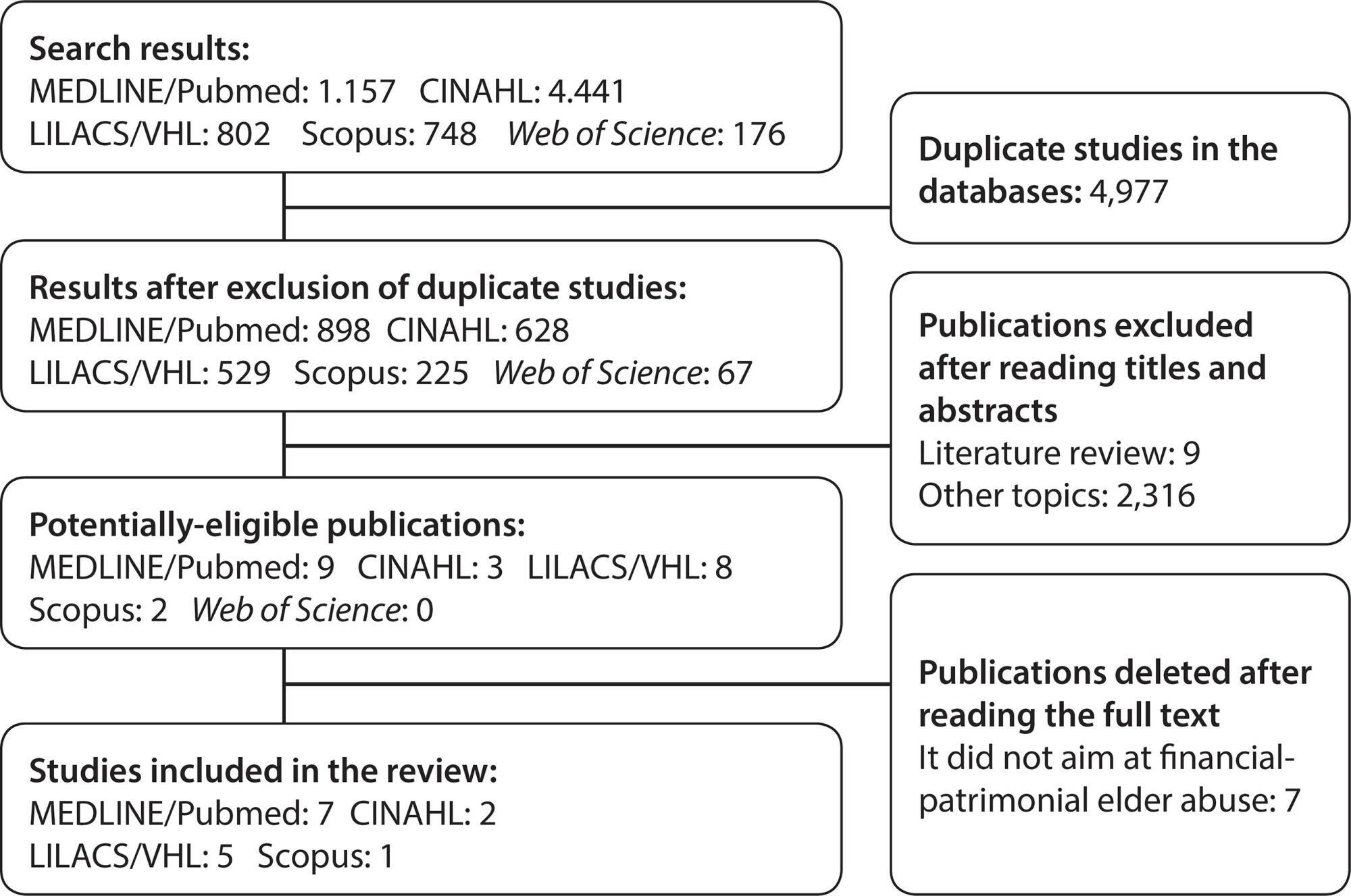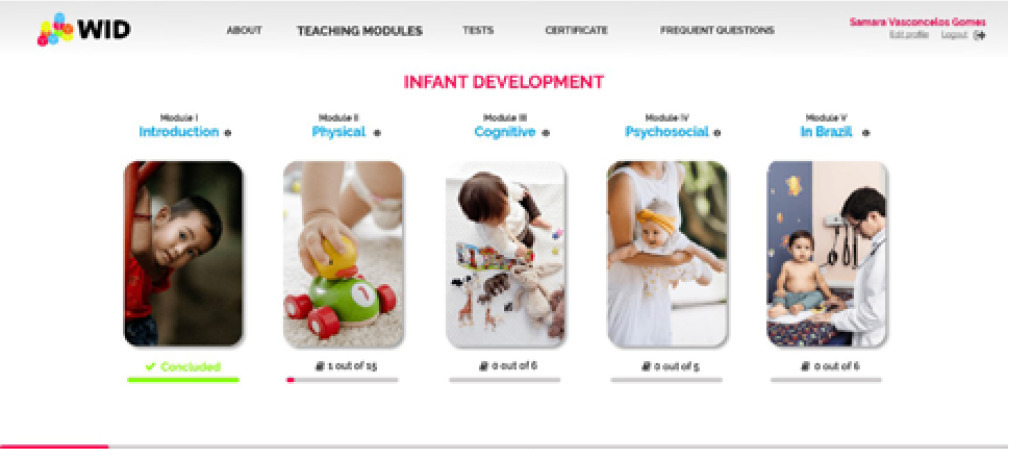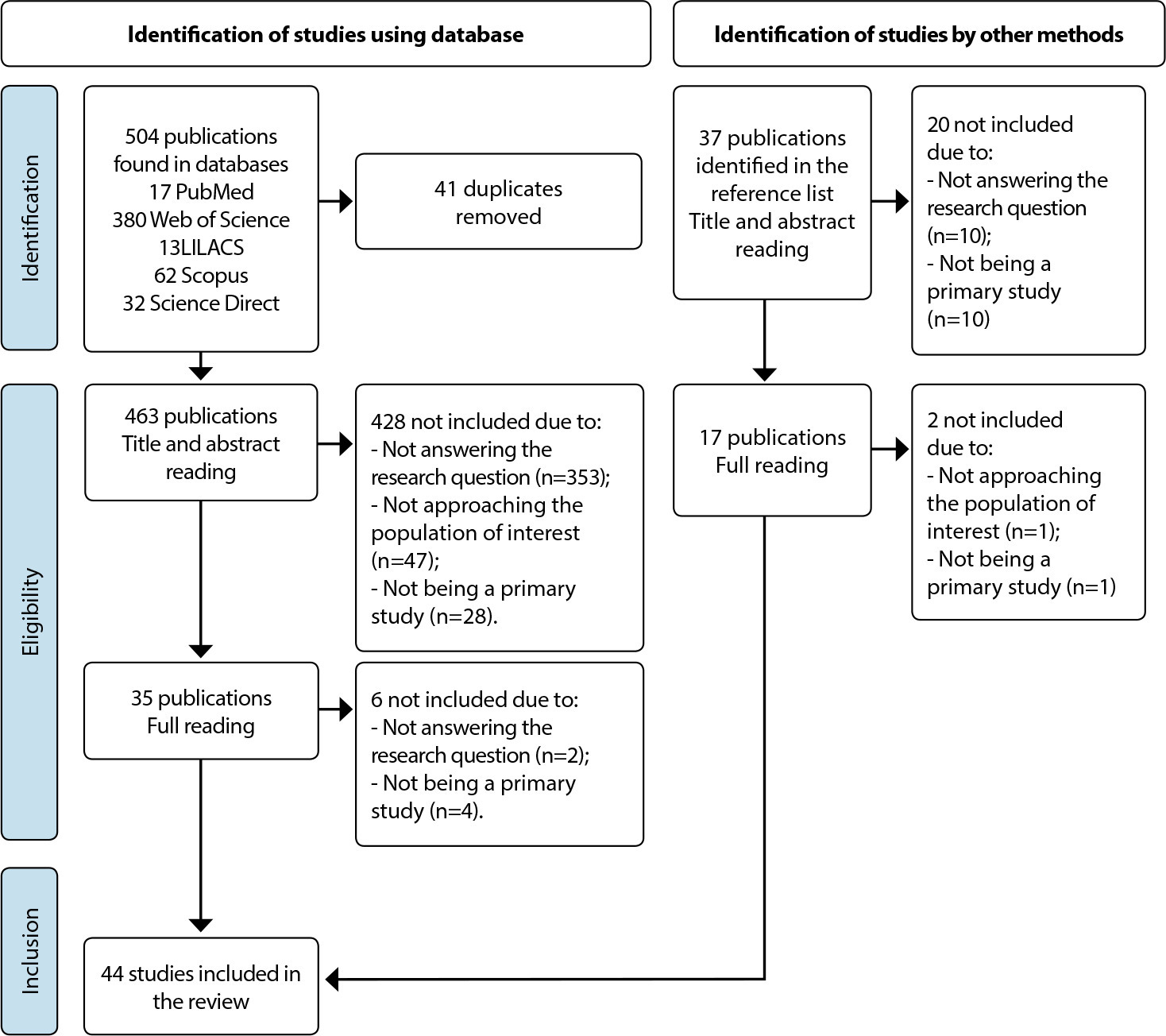-
ERRATUM01-15-2024
ERRATUM
Revista Brasileira de Enfermagem. 2024;77(1):e2024n1e01
Abstract
ERRATUMERRATUM
Revista Brasileira de Enfermagem. 2024;77(1):e2024n1e01
DOI 10.1590/0034-7167.20247701e01
Views1In the article “The ethics of nursing care for transgender people”, with DOI number: , published in Revista Brasileira de Enfermagem, 2023;76(Suppl 3):e20220797, in authorship: Where it read: […]See more -
ORIGINAL ARTICLE01-13-2024
Evaluation of care for people with HIV in Primary Health Care: construct validation
Revista Brasileira de Enfermagem. 2024;77(6):e20230190
Abstract
ORIGINAL ARTICLEEvaluation of care for people with HIV in Primary Health Care: construct validation
Revista Brasileira de Enfermagem. 2024;77(6):e20230190
DOI 10.1590/0034-7167-2023-0190
Views0ABSTRACT
Objectives:
to verify the construct validation of an instrument for evaluating care for people living with HIV in Primary Health Care.
Methods:
methodological study carried out in 2021 with 260 health professionals in Recife, PE. Validation based on the internal structure was carried out at this stage using exploratory and confirmatory factor analysis, and validity based on item response theory.
Results:
the validation determined the retention of five factors and 63 items. The instrument’s internal consistency and quality of fit was 0.90, the Tukey-Lewis index was 0.915 and the comparative fit index was 0.918 in the confirmatory factor analysis. The indication for the absolute majority of items is adequate fit.
Conclusions:
the instrument has construct validity, making it possible to use it to evaluate the decentralization process and care for People Living with HIV in Primary Health Care.
Keywords:Acquired Immunodeficiency SyndromeComprehensive Health CareHIVPrimary Health CareProgram EvaluationSee more
-
ORIGINAL ARTICLE01-13-2024
Knowledge, Attitudes, and Practices of nurses regarding blood culture collection
Revista Brasileira de Enfermagem. 2024;77(6):e20230424
Abstract
ORIGINAL ARTICLEKnowledge, Attitudes, and Practices of nurses regarding blood culture collection
Revista Brasileira de Enfermagem. 2024;77(6):e20230424
DOI 10.1590/0034-7167-2023-0424
Views0ABSTRACT
Objectives:
to investigate the knowledge, attitudes, and practices of nurses regarding blood culture collection.
Methods:
a cross-sectional study was conducted in five Brazilian public hospitals with 112 nurses. Data were collected using an adapted questionnaire and analyzed through descriptive and inferential statistics.
Results:
nurses who did not consider themselves capable of collecting blood cultures had a 72% lower chance of performing the collection at the recommended site and an 83% lower chance of using the same needle for blood inoculation into the vials. Nurses working in the emergency department had a 75% lower chance of knowing the international benchmark for blood culture contamination rates, and those with less than 5 years in the position decreased their chance of accuracy in this matter by 79%.
Conclusions:
there are gaps in the knowledge, attitudes, and practices of nurses regarding blood culture collection. Standardization of the technique, periodic education, supervision and guidance of the collection team, and process auditing are recommended coping strategies.
Keywords:Blood CultureBlood Specimen CollectionHealth Knowledge, Attitudes, PracticeNursing CareQuality of Health CareSee more
-
ORIGINAL ARTICLE01-13-2024
Nurses’ perspectives on the use of telemonitoring in the management of people with diabetes and hypertension
Revista Brasileira de Enfermagem. 2024;77(6):e20230481
Abstract
ORIGINAL ARTICLENurses’ perspectives on the use of telemonitoring in the management of people with diabetes and hypertension
Revista Brasileira de Enfermagem. 2024;77(6):e20230481
DOI 10.1590/0034-7167-2023-0481
Views1See moreABSTRACT
Objectives:
to understand the perspective of nurses on the use of telemonitoring in the management of people with type 2 diabetes mellitus and arterial hypertension in primary care.
Methods:
this qualitative research involved sixteen nurses from eight municipalities in Paraná. Data were collected between November 2022 and January 2023 through inperson or remote interviews, which were audio-recorded and subjected to content analysis.
Results:
according to the nurses, telemonitoring enhances users’ knowledge about these conditions, communication and connection with the team, and productivity. However, the lack of electronic resources and equipment, high staff turnover, low user adherence, and the limited availability of professional time present significant challenges.
Final Considerations:
the effective implementation and operation of telemonitoring in the management of people with diabetes and hypertension involve both potential benefits and barriers. It is essential to have the availability of human and technological resources, managerial support, and the commitment of professionals and users.
-
ERRATUM01-13-2024
ERRATA
Revista Brasileira de Enfermagem. 2024;77(6):e2024n6e07
Abstract
ERRATUMERRATA
Revista Brasileira de Enfermagem. 2024;77(6):e2024n6e07
DOI 10.1590/0034-7167.20247706e06pt
Views0No artigo “Crenças e atitudes de pais ou responsáveis legais sobre a vacinação infantil: revisão de escopo”, com número DOI: , publicado no periódico Revista Brasileira de Enfermagem, 2024;77(4):e20240126, página 5:Onde se lia:[…]See more -
ERRATUM01-13-2024
ERRATUM
Revista Brasileira de Enfermagem. 2024;77(6):e2024n6e08
Abstract
ERRATUMERRATUM
Revista Brasileira de Enfermagem. 2024;77(6):e2024n6e08
DOI 10.1590/0034-7167.20247706e08
Views0In the article “Brazilian nursing specific situation, middle and micro-range theories: a bibliometric study”, with DOI number: , published in Revista Brasileira de Enfermagem, 2024;77(4):e20230520, Chart 1:Where it read:[…]See more -
ORIGINAL ARTICLE01-13-2024
Indicators associated with severity and mortality in hospitalized people with HIV: A retrospective cohort
Revista Brasileira de Enfermagem. 2024;77(6):e20240204
Abstract
ORIGINAL ARTICLEIndicators associated with severity and mortality in hospitalized people with HIV: A retrospective cohort
Revista Brasileira de Enfermagem. 2024;77(6):e20240204
DOI 10.1590/0034-7167-2024-0204
Views0See moreABSTRACT
Objectives:
to compare the sociodemographic and clinical severity indicators of hospitalized people with HIV in relation to clinical outcomes and urgent hospital admission.
Methods:
a retrospective cohort study was conducted with 102 medical records of HIV-infected individuals hospitalized in a hospital in southern Brazil. In addition to descriptive analysis, Fisher’s exact test, Pearson’s Chi-square, and logistic regression were used.
Results:
the data showed a significant direct effect on severity indicators in the following variables: male sex (p=0.013), skin color (p=0.023), level of education (p=0.000), urgent admissions (p=0.000), late diagnosis (p=0.001), diabetes mellitus (p=0.001), hypertension (p=0.004), kidney disease (p=0.002), high viral load (p=0.006), CD4+ count below 200 (p=0.005), fever (p=0.016), weight loss (p=0.013), co-infection with hepatitis C (p=0.004), and mortality (p=0.007).
Conclusions:
three sociodemographic and thirteen clinical markers were identified as being associated with the risk of clinical deterioration in hospitalized people with HIV.

-
REVIEW12-05-2019
Financial-patrimonial elder abuse: an integrative review
Revista Brasileira de Enfermagem. 2019;72:328-336
Abstract
REVIEWFinancial-patrimonial elder abuse: an integrative review
Revista Brasileira de Enfermagem. 2019;72:328-336
DOI 10.1590/0034-7167-2018-0703
Views0See moreABSTRACT
Objective:
to analyze the available evidence in the nursing literature about financial-patrimonial elder abuse.
Method:
integrative review of articles indexed in the databases CINAHL, Scopus, Web of Science, LILACS and MEDLINE, from 2007 to 2017. The combination of controlled and uncontrolled descriptors was used in Portuguese, English and Spanish.
Results:
15 studies developed in seven countries were included. In the thematic analysis, three categories emerged: epidemiological data, risk factors and institutions providing services to the elderly. The occurrence of this type of violence concomitantly to the other subtypes was highlighted among the most frequent.
Final considerations:
the literature points to important epidemiological data, risk factors and characteristics of this type of violence, including within institutions providing services to the elderly, in different countries, essential aspects for structuring and rethinking public policies for protection and appreciation of the elderly.

-
ORIGINAL ARTICLE07-06-2020
Vulnerability in the health of young transgender women living with HIV/AIDS
Revista Brasileira de Enfermagem. 2020;73(5):e20190046
Abstract
ORIGINAL ARTICLEVulnerability in the health of young transgender women living with HIV/AIDS
Revista Brasileira de Enfermagem. 2020;73(5):e20190046
DOI 10.1590/0034-7167-2019-0046
Views0ABSTRACT
Objectives:
to analyze the health vulnerability of young female transgender living with HIV/AIDS.
Methods:
qualitative, descriptive, and exploratory study, based on the theoretical reference of Social Representation and concept of vulnerability; developed with six transgender women in a reference Hospital for HIV/AIDS. We analyzed the individual interviews, recorded, and transcribed in full, in the IRaMuTeQ software by Similitude Analysis.
Results:
the thematic categories are listed based on the Ayres reference: 1) Individual dimension of vulnerability to HIV/AIDS; 2) Social dimension of vulnerability to HIV/AIDS; 3) Programmatic dimension of the vulnerability.
Final Considerations:
the young female transsexual living with HIV/AIDS experience a context of vulnerability in health associated with a lack of knowledge and difficulties for the realization of self-care. The study evidenced the representations of social abjection and unpreparedness of the health team that compose the Primary Attention in Health in promoting qualified assistance for the execution of the effective and humanized care.
Keywords:Acquired Immunodeficiency SyndromeHealth VulnerabilityHIV InfectionsNursingTransgender PersonsSee more -
EDITORIAL12-13-2019
Women’s health during pregnancy, childbirth and puerperium: 25 years of recommendations from international organizations
Revista Brasileira de Enfermagem. 2019;72:1-2
Abstract
EDITORIALWomen’s health during pregnancy, childbirth and puerperium: 25 years of recommendations from international organizations
Revista Brasileira de Enfermagem. 2019;72:1-2
DOI 10.1590/0034-7167-2019-72suppl301
Views0Women’s health during pregnancy, childbirth and the puerperium has been a concern of international bodies since the 1994 United Nations International Conference on Population and Development in Cairo, Egypt. This conference had as theme Women’s Health and Safe Motherhood. The rationale for choosing the theme was that pregnancy and childbirth-related complications were among the leading […]See more -
ORIGINAL ARTICLE04-22-2020
(Dis)continuation of care of the pre-term newborn at the border
Revista Brasileira de Enfermagem. 2020;73(3):e20180827
Abstract
ORIGINAL ARTICLE(Dis)continuation of care of the pre-term newborn at the border
Revista Brasileira de Enfermagem. 2020;73(3):e20180827
DOI 10.1590/0034-7167-2018-0827
Views0See moreABSTRACT
Objectives:
to understand how continuation of care for the preterm newborn in the health care network at the border.
Methods:
the Grounded Theory was the methodological framework. Data were collected through 17 semi-structured interviews between July 2016 and March 2017.
Results:
“Describing the structure and functioning of the Child Nutrition Center” represents the context; “Experiencing and signifying premature birth” are the causal conditions; “Identifying conditions that intervene in the process of continuation of care for the preterm newborn” are the intervening conditions; “Ensuring continuation of care for the preterm newborn” are strategies; “Identifying (dis)continuation of care flows for the preterm newborn at the border” are the study’s consequences and phenomenon.
Final Considerations:
there is a need to plan referral and counter-referral flows of the preterm newborn and the commitment of public health managers to ensure continuation of care.
-
ORIGINAL ARTICLE05-09-2022
Wise Infant Development®: creation of a software for teaching in pediatric nursing education
Revista Brasileira de Enfermagem. 2022;75(5):e20210466
Abstract
ORIGINAL ARTICLEWise Infant Development®: creation of a software for teaching in pediatric nursing education
Revista Brasileira de Enfermagem. 2022;75(5):e20210466
DOI 10.1590/0034-7167-2021-0466
Views0See moreABSTRACT
Objectives:
to create a software application for nursing education on child development assessment.
Methods:
this is a methodological applied research developed in three stages: analysis, design, and development. Product quality characteristics from the ISO/IEC 25010 standards were adopted. The programming language used was JavaScript. The educational software was developed based on a constructivist cognitive theory.
Results:
it was possible to create the software from the following quality metrics: functional suitability, reliability, usability, performance efficiency, compatibility, security, maintainability, and portability. The technology addresses child development in physical, cognitive, and psychosocial domains and how this assessment should be carried out in Brazil. The software has pre and posttests, 5 learning modules, certificate issuance, support for doubts, and an administrative panel. Final Considerations: it is concluded that the software adds to the existing tools for child development monitoring, facilitating students’ knowledge acquisition in promoting child health.

-
EDITORIAL12-04-2023
Nursing and the Sustainable Development Goals (SDGs): An Essential Commitment
Revista Brasileira de Enfermagem. 2023;76(6):e760601
Abstract
EDITORIALNursing and the Sustainable Development Goals (SDGs): An Essential Commitment
Revista Brasileira de Enfermagem. 2023;76(6):e760601
DOI 10.1590/0034-7167.2023760601
Views0The Sustainable Development Goals (SDGs) are a global initiative launched by the United Nations (UN) in September 2015 as part of the 2030 Agenda for Sustainable Development, whose objectives summarize a universal call to action to end poverty, protect the environment and ensure that all people have access to opportunities and well-being, all in an […]See more -
REVIEW04-22-2022
Health needs of mothers of children with Congenital Zika Syndrome: an integrative review
Revista Brasileira de Enfermagem. 2022;75:e20210540
Abstract
REVIEWHealth needs of mothers of children with Congenital Zika Syndrome: an integrative review
Revista Brasileira de Enfermagem. 2022;75:e20210540
DOI 10.1590/0034-7167-2021-0540
Views0ABSTRACT
Objectives:
to evidence and analyze the health needs of mothers of children with Congenital Zika Syndrome.
Methods:
a total of 44 articles published between October/2015 and March/2021 on PubMed, LILACS, Scopus, Web of Science and Science Direct were included. The RTI bank and CASP score were applied to classify the methodological quality of the studies. Reflective content analysis and Cecílio and Matsumoto’s taxonomy were used for analysis. Visual map was used as a technique for presenting the results.
Results:
mothers need access to social protection, family-centered, multi-professional empathetic monitoring, cultivating bonds and affection by professionals, sharing of care between health network services, strengthening the social support network and fostering coexistence groups between them.
Final Considerations:
intersectoral initiatives must be implemented for better housing conditions, fighting stigma, holding parents accountable and resuming life project.
Keywords:CaregiversCongenital AbnormalitiesHealth Service Needs and DemandMaternal and Child HealthZika Virus InfectionSee more
-
REFLECTION12-21-2020
War against the COVID-19 pandemic: reflection in light of Florence Nightingale’s nursing theory
Revista Brasileira de Enfermagem. 2020;73:e20200371
Abstract
REFLECTIONWar against the COVID-19 pandemic: reflection in light of Florence Nightingale’s nursing theory
Revista Brasileira de Enfermagem. 2020;73:e20200371
DOI 10.1590/0034-7167-2020-0371
Views0See moreABSTRACT
Objective:
To reflect on the relationship and importance of the environmental theory regarding practices for promotion, prevention, and treatment of COVID-19.
Methods:
A theoretical-reflexive study about the COVID-19 pandemic in light of the environmental theory proposed by Florence Nightingale.
Results:
It is observed that the application of the theoretical foundations proposed by the environmental theory is related to the current practices used in the fight against the COVID-19 pandemic.
Final Considerations:
It is believed that the theoretical basis is fundamental for the critical-reflexive training of the nursing professional, for the consolidation of Nursing as a science; therefore, it could provide a foundation in nowadays battle against the pandemic.
Search
Search in:
Nuvem de Tags
Aged (144) Atenção Primária à Saúde (239) COVID-19 (104) Cuidados de Enfermagem (269) Educação em Enfermagem (151) Educação em Saúde (139) Enfermagem (930) Estudos de Validação (131) Health Education (144) Idoso (208) Mental Health (149) Nursing (987) Nursing Care (306) Patient Safety (151) Primary Health Care (284) Qualidade de Vida (104) Quality of Life (106) Saúde Mental (145) Segurança do Paciente (150) Validation Studies (108)




